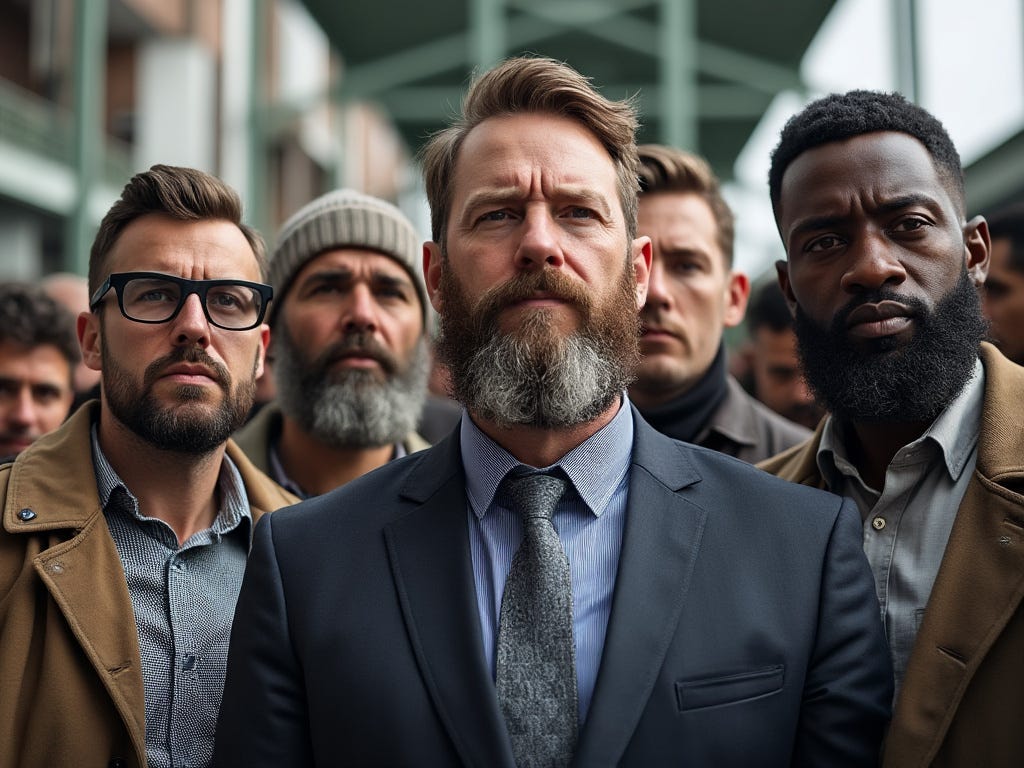Note from Greg: This one is pretty clip-heavy if you want to check out the video version of this article, see the links below:
—
Companies like Goodyear, Folgers, and Xerox carefully follow DEI policies to keep stakeholders happy, avoid civil rights lawsuits, and maintain the social status quo.
But in the 1960s, these brands' marketing teams wouldn’t exactly pass today’s HR and PR standards. Younger people today would look at these ads and wonder, “How could they be so backward?”
Assuming their heads don’t explode first.
Just take a look at this one from Goodyear, which claims their new Polyglass tires were so tough that they could withstand the abuse of a woman driver:
Coffee giant Folgers once urged women to buy their instant roast if they struggled to make a decent cup for their husbands:
And Xerox encouraged businesses to consider their copy machines, which were so easy to use that even the office bimbo could figure it out:
But as Second Wave Feminism progressed, companies shifted their marketing tactics to avoid being the target of women’s advocacy groups and boycotts.
As a result, companies began to portray women in more vital and independent roles.
For example, Virginia Slims cigarettes launched their “You’ve Come a Long Way, Baby” campaign, which mocked the old days when people frowned upon women smoking in public. Or at all, for that matter.
This would be considered sexist today, by the way.
In 1983, Apple released its “1984” themed Super Bowl commercial, which portrayed female English Olympic hammer swinger Anya Major symbolically defeating “Big Brother,” signaling a social break from traditional norms.
Ironically, feminism and progressivism were exactly the bludgeons used to put us in the dystopian novel years later.
And who can forget the non-stop “That's Sexual Harassment, and I Don’t Have to Take It” Campaign through the 1990s?
Ladies, you can blame these commercials for your $300 salon trip going unnoticed, by the way.
By the turn of the century, the “Glass Ceiling” was shattered, swept up, and chucked in the trash. By men, most likely.
Before long, women in the workplace were no longer unique: Women weren’t just taking dictation and making copies anymore. They headed departments, divisions, and companies. Sexual harassment training became mandatory, and discrimination could not only get you fired but slapped with a lawsuit.
The problem for corporate marketing teams was that they still needed idiots in their ads to illustrate product ease of use.
Enter the Hapless Husband, the Bumbling Boyfriend, and the Disorganized Dad. Simply make men the patsies. This way, brands would be safe from progressive pushback, and if any men complained, they would be instantly mocked.
Making fun of men had another advantage, as consumer data showed that women were likelier to make purchasing decisions in the household anyway.
It was a win-win-win.
Before long, it was the men who couldn’t drive, make a decent cup of coffee, or figure out the copy machine.
And it’s been working for decades.
Anti Man Ads
AOL was a trailblazer in the Derelict Dad campaign, starting with this guy waking his kid up in the middle of the night to figure out the computer.
T-Mobile picked on Dad and his brother for being idiots back in the ‘Fave 5’ Fliphone days:
And Mom outright called Dad’s idea for alternative socks stupid in this Hanes commercial:
Of course, countless more ads show men as incompetent, usually in cleaning or home products, where Dad just can’t figure out whether that striped shirt should go in with the colors or whites.
Around 2015, the “Dad Bod” phenomenon took off, highlighting out-of-shape shape men, which is said to represent a break from traditional masculine expectations. Brands like Dollar Shave Club and Stanley Steamer took advantage of the hype.
Imagine the social justice war that would have ensued had there been even one “Mom Bod” ad.
But it wasn’t just about making fun of men. Around that time, Proctor and Gamble launched their “Thank You, Mom” campaign, which sparked debate about sidelining Dad on screen.
This led to a 2016 poll that found 2/3rds of dads felt society didn’t fairly recognize their roles.
Brand messaging also impacted young boys’ expectations of women, such as this Dairy Queen commercial where a young girl seduces a boy to get him to order him a treat, a tactic she likens to “shooting fish in a barrel.”
Most might say this is supposed to be funny, but what does it say to young boys? That they should expect women to manipulate them? And do ads like this tell young girls this is not only acceptable, but you might get a “hey look at you” from Mom?
Hollywood Hapless Husbands
It’s worth mentioning the Idiot Dad trope in entertainment, as it’s often mixed into the debate.
TV hits like Everybody Loves Raymond, Married with Children, Family Guy, Home Improvement, 2 1/2 Men, Bewitched, and The Simpsons were all built around this theme.
Even for the diversity dream cast that was Modern Family, producers ensured Phil Dunphy maintained the stereotype in question.
And it wasn’t just the silver screen. Films like Father of the Bride, Uncle Buck, Grown Ups, Old School, Step Brothers, National Lampoon series, and many others made millions with Man Children.
Still, the entertainment industry as a whole kept things in balance.
For every Al Bundy, Clark Griswold, or Ray Barone (or his brother or Dad, for that matter,) we could find strong male roles in programs like Family Matters, Growing Pains, Fresh Prince, 24, Walker, Texas Ranger, Star Trek, Macguyver, Magnum PI, Yellowstone, 24, Blue Bloods, NYPD Blue, Law and Order, and take your pick from the superhero universes.
Also, although often the butt of the joke, we got to know our Al Bundys, Homer Simpsons, and Tim “The Toolman” Taylors over the years. Although usually dim, they were more loveable and perhaps relatable than anyone else.
They didn’t call it Everybody Loves Raymond for nothing.
In advertising, we don’t make those long-term connections. Instead, commercials pepper us with rapid-fire mini stories with nameless people who portray men as imbeciles.
And it’s impacting our social outlook.
Dad’s Home. And He’s Pissed
Men would have been laughed out of town ten or twenty years ago if they suggested advertising was actively anti-male, and the idea of a ‘men’s rights advocacy group’ would be considered absurd and misogynist.
But men grew tired of this Hapless Husbandry, and men’s rights organizations do exist and have been pushing back beneath the surface for some time.
In the early 2010s, groups like the National Coalition for Men (NCFM) called out the anti-male discrimination that dominated most commercial breaks.
The issue even made CNN’s Headline News during a 2012 segment, if you can believe it with your post-2020 eyes.
In the same year, men became more comfortable speaking out after popular blogs like The Dadvocate and Blather. Wince. Repeat, and mainstream outlets wrote about the issue, igniting further online debate.
While many people thought the argument was an uphill battle, men were surprised when advertisers responded.
Corporate Response
Several companies eased up on the Dull Dad ads in response to the public backlash.
For example, Dove’s Men + Care campaign portrayed men in more competent and loving father roles, as they did with this 2015 Super Bowl ad:
Proctor and Gamble toyed with the idea in their Tide advertisements.
And Cheerios launched their #HowToDad operation in 2015, which praised everyday Dads for their domestic responsibilities.
While the Floundering Father wasn’t completely absent from commercial breaks, there was at least more variety within messaging.
Marketing Evolves
Then, 2020 happened.
Whatever progress men made was washed away in a new wave of censorship, toxic masculinity, intersectionality, inclusivity, and equity.
Whether standard anti-male or DEI-infused marketing, it’s all low-level conditioning that impacts viewers, especially kids’ social outlook.
Children see between 13,000 and 30,000 ads on TV each year, not including social media, print, and other online content. It must influence how they see social roles and themselves.
This was a major reason for feminists' fighting against sexist ads in the 1960s to begin with.
In 2024, you’ll find a mix of marketing tactics regarding the father figure, such as Verizon’s Dramatic Dad campaign. Here’s one where Dad just can’t control his emotions or understand how to lower the phone bill while Mom and the kids remain calm and reasonable.
Here’s a touching Cetaphil ad where Dad just wants to spend time with his daughter.
Uber deployed this seemingly over-organized Dad to advertise their Reserve Pickup Service, which gets his family to the airport 5 hours early.
Kayak’s “Kayak Denier” campaign shows Dad as the one ruining the fun with his crazy conspiracy theories:
But there’s also a Mom version. She’s white, too:
But that’s a video for another day.
For now, I think in the past few years, many of us realized we’ve been programmed to believe certain things, and TV brainwashing doesn’t seem so far-fetched anymore.
And it’s impacting the next generation.
Earlier this year, Reuters published an article on a global study showing that young men are becoming more conservative in the US and globally. This is a clear result of society constantly telling men they are the threat, the guilty, or at least the incompetent, as we’ve seen them do so well with all three.
It’s no wonder conservative-leaning figures like Tom Brady, Jordan Peterson, and David Goggins have gained popularity. The youth are starving for strong male role models.
We here in 2024 laugh at the absurdity of the ad campaigns of the 1960s, but before we know it, future Americans will watch clips of the commercials of our time and ask the same question.
How were people so backward back then?
GB










Great topic and so true. I've also noticed how alot of current tv and movies have women as the leaders when a man could easily fill the roll. I actually didn't know men have been pushing back. Those old commercials blow my mind!! Great job Greg!